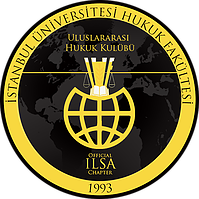
Author: Neslihan Pelvan
Translated by Reyyan Yasemin Kaya
Edited by Ali GÖÇMEN
Common habitats of all creatures create the environment. Right to environment, like the other solidarity rights, represents a sense of life as a certain community and can only be achieved with the integration of the efforts of people who contribute to social life . Law of Environment, which also includes this right, is a branch of public law and emerged during the 20 th Century.
In order to actualize solidarity among people; protect and improve common values through solidarity, United Nations Educational, Scientific and Cultural Organization (UNESCO) started to make an effort to create new human rights. As a result, right to peace, right to development, right to self-determination and solidarity rights, which includes right to environment, are determined as the third generation rights.The issues that “can only be solved if all the humanity stands side by side” or “cannot be overcome by states or people individually” are the matters that concerns solidarity rights. This is the point that international organizations, institutions, agreements and non-governmental organizations step in.
Unprotected environment and the problem of environmental pollution is not only limited to the states origin of the pollution but also affects and concerns other states and people around the world. As a natural consequence, to make international regulations on environment have became mandatory. Towards this purpose, international meetings have been held and international conventions have been signed.
Many international documents include provisions about “environment, right to environment and participation ”. This has shown the importance given to participation dimension of right to environment by the international law. The very first action taken in this area was Berlin Conference in 1913. This conference was about protection of landscapes and was followed by other conferences in Paris and London in 1923. After that, many other international meetings were organized too. These meetings were mainly about the protection of nature, natural vegetation, wild animals and cultural assets. In 1965, advisory boards in connection with to UN’s specialized agencies were established. In 1970, European Convention Concerning the Protection of Nature was organized. Besides the international improvements about the pollution and protection of the environment, some studies were started in the United Nations in 1971. In 1973, these studies created the “United Nations Environment Programme”. Also today, these studies are still being conducted by UNEP. At the end of the “United Nations Conference on the Human Environment” that was held in Stockholm in 1972, a very important notice about environmental problems and the protection of the environment was published. Under the title of “ Strengthening the Roles of Other Groups” of Agenda 21, which was accepted in Rio as a comprehensive work programme of the 21 st century, provisions about the active participation of women, children and young people, natives and non-governmental organizations were taken.
Throughout the 20 year period, from Stockholm Conference to Rio Conference, some other international documents has also included provisions related to participation. Article 6 entitled "Preliminary Notification, Possibility and Process" in the summary of the proposal of the " Principles of the Protection of Environment and Sustainable Development " adopted by the Environmental Law Experts Group of the World Commission on Environment and Development has imposed obligations on this issue. Besides the international organizations and institutions in international law, it is also necessary to mention Greenpeace as a non-governmental organization. The seeds of Greenpeace were spreaded when a few people went to Canada from US state of Alaska in order to protest nuclear experiments. Against the environmental crimes which cause an unlivable world, Greenpeace conducts campaigns based on scientific data’s and brings these crimes up to the agenda through media by witnessing them with non-violent protests. Greenpeace Turkey Office became active in Istanbul in 1992.
International Environment Conventions which Turkey is a party to
- European Landscape Convention (Florence Convention)
- Berne Convention on the Conservation of European Wildlife and Natural Habitats
- The Barcelona Convention for the Protection of the Marine Environment and the Coastal Region of the Mediterranean
- Convention for the Regulation of Whaling
- Convention on biological diversity
- United Nations Framework Convention on Climate Change
- Convention for the Prevention of Marine Pollution from Land-Based Sources
- International Convention for the Prevention of Pollution from Ships (Marpol 73/78)
- The Convention concerning the Protection of World Cultural and Natural Heritage
- Stockholm Convention on Persistent Organic Pollutants
- Convention on International Trade in Endangered Species of Wild Fauna and Flora
- Vienna convention for the protection of the ozone layer
- United Nations Convention to Combat Desertification in Those Countries Experiencing Serious Drought and/or Desertification, Particularly in Africa (UNCCD)
- Convention on Wetlands of International Importance especially as Waterfowl Habitat (Ramsar Convention)
- International Convention on Civil Liability for Oil Pollution Damage
- International Convention on the Establishment of an International Fund for Compensation for Oil Pollution Damage
- Basel Convention on the Control of Transboundary Movements of Hazardous Wastes and Their Disposal
- Convention on Long-Range Transboundary Air Pollution
This particularly important right to environment also found its place in our domestic law. 56 th article of our Constitution says “Everyone has the right to live in a healthy and balanced environment. It is the duty of the State and citizens to improve the natural environment, to protect the environmental health and to prevent environmental pollution.” As it is understood from the article, our Constitution regulated the right to environment with three different angles; duty of state, duty of citizens, a right of everyone. In order to protect the environment, the common assets of all living, in accordance with the principles of sustainable environment and sustainable development, The Environment Law No. 2872 entered into force on August 9, 1983. Regarding the implementation of the Law, various regulations have been made. Against the breaches of the regulations of the protection of the environment, penalties have been laid down in the 20th and subsequent articles of the Environmental Law. In addition, penalties are imposed on crimes committed against the environment in Article 181 of the Turkish Criminal Code numbered 5237 and in the following articles.
With the aim of protection and improvement of the environment, usage and conservation of rural and urban area land and natural resources in an efficient manner, protecting and developing natural vegetation and animal assets and natural wealth of the country and preventing all kinds of environmental pollution, The Ministry of Environment and Forestry has been established with the Law No. 4856 dated 01.05.2003. “Foreign Affairs and European Union Department” exists under the Ministry, in order to lead and follow the implementation of the protocols in force concerning the Ministry within the scope of international agreements that concerns Ministry, regulate relations with other countries , provide necessary liaison and coordination. Law of Environment has assigned everyone, notably administration, professional chambers, associations and non-governmental organizations, with the protection of environment and prevention pollution. Article 90 of our Constitution has made the international agreements, which our country is a party to, into the domestic law under the title of "Ratification of International Treaties". In the light of these developments, especially in the cases related with environment, the application conditions of administrative judiciary in Turkish legal system have become advanced compared to many other countries. With our administrative law, adopted from the French system, administrative jurisdiction has enhanced the scope of interest relations in the cases related to environment and extended the right to sue. In our country, the week between 5th and 11th of June has been accepted as Environmental Protection Week for the protection of environment and environmental problems. If we can create and finance an effective international environment and development organization to enforce an environmental policy for sustainability for the 21st century today, we can leave a more livable environment for future generations. In this regard, increasing the applicability of the agreements through legal sanctions will also be a positive effort .Environmentally sensitive societies should be raised up with the principle of “Tomorrow’s nature will be created from today, and countries should make more effective arrangements to protect the environment in their national laws and international agreements should also be made more efficient.
BIBLIOGRAPHY
- KABOĞLU, İ., Çevre Hakkı, 3. Baskı, İmge Yayınevi, Ankara, 1996.
- PALLEMAERTS, M., “Stockholm’den Rio’ya Uluslararası Çevre Hukuku
- http://www.cekud.org.tr/haberx/143-cevre- hakki-kavraminin- tarihsel-gelisimi.html
- http://www.cevreonline.com/hukuk/cevhukuk_tarihce.htm
- iibfdergi.cumhuriyet.edu.tr/archive/uluslararas%C4%B1%20%C3%87evre%20hukukunun%20geli%C5%9Fimi%20%C3%9Czerine%20bir%20%C4%B0nceleme.pdf
- www.cygm.gov.tr
- izindenetim.cevreorman.gov.tr/izin/AnaSayfa/birimler/uluslarasiKuruluslar/uluslararasiSozlesmeProtokolAnls/TurkiyeninTarafOlduguCevreSozlesmeler.aspx?sflang=tr
- tr.wikipedia.org/wiki/Greenpeace
- http://www.istanbul.edu.tr/yerkure/Cevhak.htm
- http://www.mevzuatdergisi.com/2010/03a/02.htm
- http://www.csb.gov.tr/db/cygm/editordosya/KNN-2872cevrek5491isli.pdf

